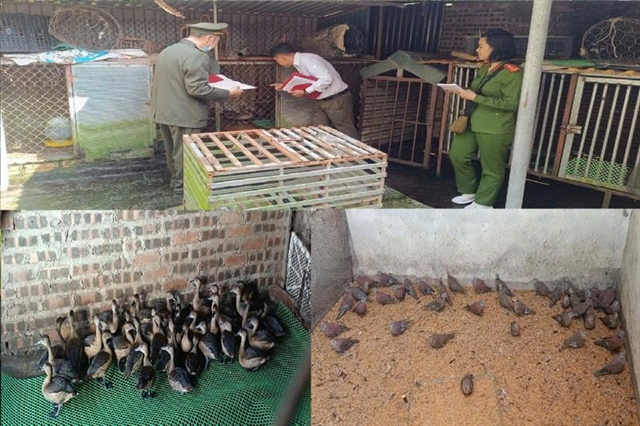 Environment
Environment


|
| An officer rescues a bird caught in a net trap.— Photos courtesy of the task force |
PHÚ THỌ — Authorities in northern Việt Nam have seized more than 4,000 wild animals in two coordinated raids this week, exposing what officials say is one of the largest illegal poaching operations uncovered in the region in years.
The largest discovery came on Thursday in Phú Thọ Province, where a joint task force of environmental police, forest rangers and local officers raided a facility owned by a woman identified as Phạm Thị Vượng after several days of surveillance.
Investigators found 4,059 animals being held in captivity on the property, most of which had no documentation proving legal origin.
All of the animals were seized for verification, and officials said the findings could lead to criminal charges under Việt Nam’s wildlife protection laws.
A separate team carried out surprise inspections the same day in two communes in Thanh Hóa Province, where reports had surfaced of large-scale operations involving the netting and trapping of wild birds.
Officers found broad stretches of nets strung across fields, along with batteries, loudspeakers and other equipment typically used to lure and trap migratory and native species.

|
| Several species of birds were found at the facility. |
Seventy-nine birds were confiscated in total, including night herons, egrets and storks. The team also dismantled five major trapping sites and seized about 35kg of netting – roughly 500m – along with 17 lure speakers and an amplifier.
Forest rangers noted that the two raids highlight the persistence of illegal wildlife trapping and trading, particularly in rural areas where longstanding hunting practices and financial incentives often override regulations.
Thanh Hóa's Forest Protection Department said it would expand cooperation with local authorities and police to curb wildlife violations.
It also urged stronger community outreach in villages where trapping and trading remain common, stating that lasting change will depend on shifting local attitudes as much as enforcement. — VNS




